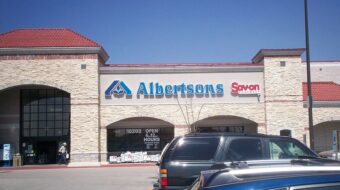Lessons from Massachusetts
Flávio Casoy’s recent article on differences within the health care reform movement and within labor misconstrues the facts. There is strong and growing support within labor, and among the people in general, for single-payer health care reform as reflected in HR 676, Medicare for All. There are operatives of both the national AFL-CIO and national Change to Win, especially from SEIU, who have been working hard to marginalize those who have been struggling for health care justice. We in Massachusetts know quite well we cannot afford to sustain the presence of the commercial health insurance industry and other corporate profiteers. We nurses have launched a movement to unite 150,000 of our numbers initially, with the creation of health care justice as a founding principle, and by that we explicitly mean Medicare for All.
I trust the PWW will give full coverage to the hearing on “National Lessons from State Health Reform: The Massachusetts Case Study.”
Sandy Eaton
Via e-mail
Flávio Casoy responds: Mr. Eaton’s comments emphasize the important work that many people in the labor movement are doing to promote real health care reform. This work is to be celebrated. As I mentioned in my opinion piece, the labor movement is split on this issue because many people are afraid to lose the health care they have now. This fear can only be solved by continuous engagement and mobilization by progressives in and out of the labor movement. This is why progressives must work with the labor movement, even when individual unions take stances that are not in line with single payer. For this reason, I think that it is important for progressives to work with HCAN and bring a strong single-payer voice to the table.
Poverty and the media
The reason the plight of the poor, along with solutions, is not covered in the media is advertisers do not pay attention to employers paying less then the amount needed for their workers to pay their bills. Poverty isn’t just not having enough to eat, it is having to decide what bills are paid this month. It is not having a bank account, or recreation. Destitution is feeling less than human.
Life feels like being in a constant hurricane. Lost is a way of life. Poverty is an equal opportunity unnatural disaster. One created by people.
Those making less than $70,000 a year are not the middle class, they are our society’s pawns. If you are not dirt poor, you think of yourself as middle class. In fact, society works because around 70 percent of people of all incomes think of themselves as the working middle class.
Anyone visiting from an enlightened culture would wonder why employers are not ashamed of paying less then it costs to live. It costs a burger flipper or store clerk as much for rent and utilities as it does anyone else. Advertisers do not realize that they would be getting a better return when companies pay their workers a decent wage.
A Maine law firm released a Social Security newsletter that documents the flaw in SSI: “In our area, about 63 percent of initial applications are denied. Yet, two-thirds of those who appeal their denials eventually win their cases.”
From a social perspective you might ask, “How do the disabled stay alive until they win?” Ingenuity and kindness is the answer. Some do not stay alive, or win.
But the question I want you to ask is, “Why doesn’t the American broadcast and print media tell the general public about this unthinkable, inhumane system existing?”
Please write your local and national newspapers and TV stations saying, “I want the untold stories.”
Jan LightfootLane
Fairfield ME
Cuba’s 50th
Having recently recovered from an illness, I now greet Cuba with congratulations on her 50th anniversary of the victory of socialism.
As visitors to Cuba in April 1959, my wife Helen and I were guests of Capt. Jorge Alvarez, who fought alongside Commandante Fidel Castro. We represented the Wisconsin Committee for Peace and Justice. Since we were the only peace representatives to visit Cuba at the time, Alvarez was anxious to hear our opinion of the Cuban revolution. We surprised him because we said we thought this revolution was different from any other revolution. He differed with us but invited us back to Cuba as his personal guests the following year.
The following year in December, the Wisconsin Committee for Peace and Justice had gotten together with the Chicago Peace Council and the Detroit Peace Coalition and formed the Midwest Fair Play For Cuba Committee. We chartered a plane from Midway Airport which took 175 passengers (my two little girls of 10 and 11 years of age were there) and we landed in Havana for a stay of two weeks.
We contacted the captain soon after arriving in Havana and spent time with him in Mayeri, the birthplace of Fidel Castro.
We also met Rosita Antich Coro, who was dean of the English department of Havana University, who volunteered as our interpreter. She was a key person who assisted in contacting many officials in Cuba who worked with our committee in bringing over many Americans and tons of medical supplies.
After that, it was impossible to travel to Cuba until 1978 when Jimmy Carter allowed travel. From 1978 until today, our committee brought to Cuba thousands of dollars of medical supplies donated by doctors in Milwaukee, and hundreds of visitors, including a dozen state legislators, the president of the state Senate, several members of the clergy, and 22 high school students and 22 teachers.
Our organization donated four school buses, a 10-ton truck loaded with 1,000 reams of paper, a commercial printing machine, 30,000 pounds of powdered milk (with the help of Pastors for Peace), 200 pounds of agricultural seeds and a medical machine donated by the Central United Methodist Church which assisted in preventing blindness with Vitamin B, at a time when Vitamin B was very scarce.
The Wisconsin committee donated $57,000 in cash which assisted in building a soy bean milk factory, contributed to the founding of Jose Marti School and other schools and assisted in the printing of the history of the Cuban labor movement.
John Gilman
Milwaukee WI
Recommended: ‘Waltz with Bashir’
I always read your movie recommendations. I hope that you will tell your readers about a marvelous movie, “Waltz with Bashir.” The animated film deals with the horrendous 1982 massacre at the Sabra and Shatila refugee camps where Palestinians, old men, women and children, were massacred by Lebanese Phalangists with the help of the Israeli army. It illustrates to perfection that war is hell.
Elaine Flannigan Turk
Portland OR
We want to hear from you!
By mail:
People’s Weekly World
3339 S. Halsted St.
Chicago IL 60608
e-mail:
Letters should be limited to 200 words. We reserve the right to edit stories and letters. Only signed letters with the return address of the sender will be considered for publication, but the name of the sender will be withheld on request.
Follow us on twitter – www.twitter.com/peoplesworld

MOST POPULAR TODAY

High Court essentially bans demonstrations, freedom of assembly in Deep South

Zionist organizations leading campaign to stop ceasefire resolutions in D.C. area

U.S. imperialism’s ‘ironclad’ support for Israel increases fascist danger at home


UN warns that Israel is still blocking humanitarian aid to Gaza





Comments